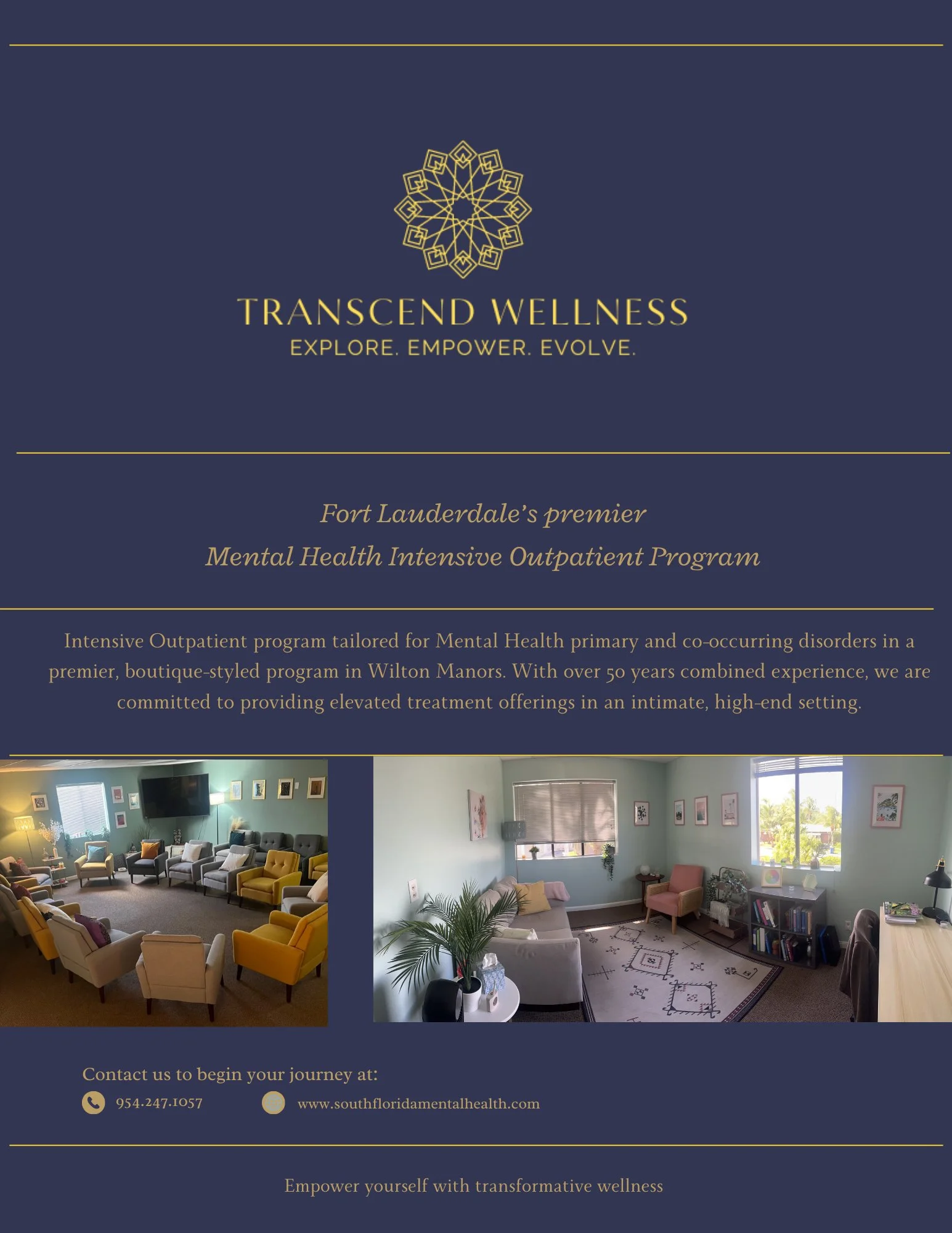Transcend Wellness Intensive Outpatient Program
Intensive Outpatient Program - IOP
In the complex landscape of mental health care, individuals facing challenges such as depression, anxiety, substance abuse, or other mental health disorders often find themselves needing more support than just outpatient individual therapy, but also needing to maintain a normal work schedule and take care of day-to-day responsibilities. Intensive outpatient treatment affords individuals effective and flexible treatment without the need to compromise other facets of life. Each patient receives individualized clinical and psychiatric treatment plans, group therapy, and one-on-one therapy sessions. Our program is clinically robust and designed to foster healing and growth regardless of barriers. We offer a supplemental intensive trauma track, including EMDR, for those in need of immediate relief from PTSD symptoms.
Transcend Wellness is an intimate, boutique style, family-owned intensive outpatient program in Wilton Manors, Florida. Our program was created when three experienced therapists consistently struggled to find the treatment options and support for their patients. From this need, Daniel Rubin, LMHC, Catherine Lovern LCSW, and Emily Woods, LMHC decided to design and build a top of the line, clinically driven and tailored IOP treatment program. Transcend Wellness accepts most major insurance plans (out of network only).
Catherine Lovern, LCSW Dr. Richard Seely, MD. Beth Sullivan-Jawitz, PMHNP Daniel Rubin, LMHC. Emily Woods, LMHC
Chief Clinical Officer Medical Director Psychiatric Nurse Practitioner. Chief Financial Officer Chief Executive Officer
Click For More Information
Call Us
Benefits of Transcend Wellness IOP
Benefits of Intensive Outpatient Program (IOP) for Mental Health:
1. **Flexibility and Accessibility:**
One of the primary advantages of an Intensive Outpatient Program is its flexibility. Individuals can attend scheduled sessions during the day or evening, allowing them to continue their daily routines, fulfill work obligations, and maintain connections with their support networks. This accessibility is crucial for those who seek treatment without disrupting their professional and personal lives.
2. **Tailored Treatment Plans:**
IOPs are designed to provide personalized and comprehensive care. Mental health professionals assess each participant's unique needs, creating a customized treatment plan that addresses specific challenges and goals. This tailored approach ensures that individuals receive interventions and therapies most relevant to their situation, fostering more effective outcomes.
3. **Structured Support Without Residential Constraints:**
Unlike inpatient programs, IOPs do not require individuals to stay overnight. This non-residential model allows participants to benefit from a structured support system while still residing in their homes. This aspect of IOPs is particularly beneficial for those who do not require 24-hour supervision but still need intensive therapeutic interventions.
4. **Community and Peer Support:**
IOPs often incorporate group therapy sessions, providing a sense of community and shared experience among participants. Engaging with peers facing similar challenges fosters a supportive environment, reducing feelings of isolation. Sharing successes and setbacks within a group setting can contribute significantly to the healing process and enhance motivation.
5. **Real-world Application of Skills:**
IOPs focus on equipping individuals with practical coping mechanisms and life skills. Participants have the opportunity to apply these strategies in their everyday lives, reinforcing the learning process. This real-world application enhances the effectiveness of the therapeutic interventions, promoting lasting positive changes.
6. **Continuity of Care:**
IOPs serve as a crucial bridge between more intensive inpatient care and less structured outpatient services. They offer a level of care that is more comprehensive than standard outpatient treatment, ensuring that individuals receive the support they need during critical phases of their recovery. This continuity of care enhances the likelihood of sustained well-being.
7. **Cost-Effective Alternative:**
Intensive Outpatient Programs are often more cost-effective than inpatient alternatives, making mental health treatment more accessible. The reduced expenses associated with residential facilities, such as room and board, contribute to making IOPs an attractive option for those seeking quality care within a more manageable financial framework.
In conclusion, the benefits of an Intensive Outpatient Program for mental health are multifaceted, addressing the diverse needs of individuals while offering a balance between structure and flexibility. These programs play a vital role in supporting individuals on their journey towards improved mental health and overall well-being.








